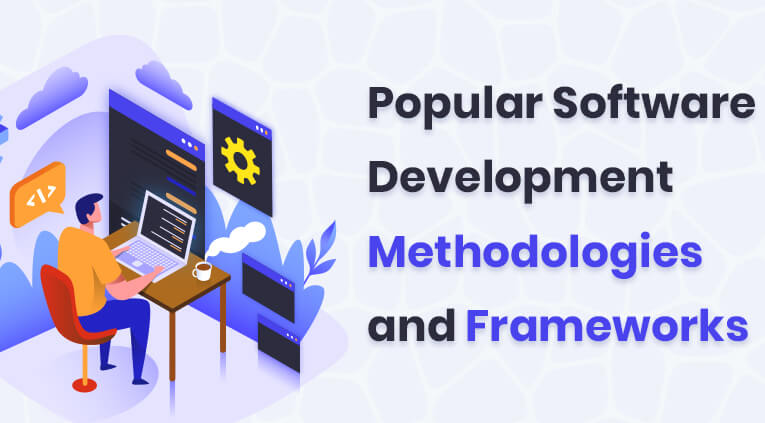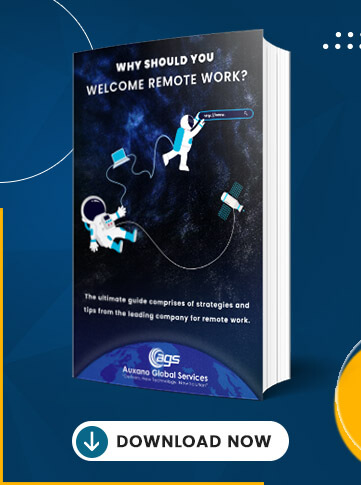The process of engineering a software has evolved rapidly in past years. Earlier, the software development process consisted of two key steps: development and delivery. Different programmers would code different parts of the software and pass it to the delivery managers. These delivery managers would compile all the code at once and deploy it to the server. Naturally, this resulted in code compatibility issues, a factor resulting in bugs, inefficiency, and delivery delays.
However, with the arrival of agilistic development trends, new and more innovative approaches like DevOps have gained widespread popularity. The DevOps approach not only speeds up the system development lifecycle but also ensures optimal program quality. All you need here is a team of DevOps engineers to handle the SDLC.
However, in many cases, building your own in-house DevOps team can be a complicated affair, especially when you aren’t aware of the nits and grits of the DevOps methodology.
Resulting from this, most businesses prefer to go with DevOps outsourcing. This approach to DevOps engineering is not only popular but is also widely adopted. In this blog, we will be thoroughly discussing DevOps as a concept in IT engineering and how businesses can outsource DevOps.
By the end of the blog, you will be able to curate a flawless strategy to outsource your DevOps requirements. So, make sure to read carefully till the very end. Let’s start the blog with the 101s of DevOps to create a strong foundation for the concept.
Back to Basics: What is DevOps?
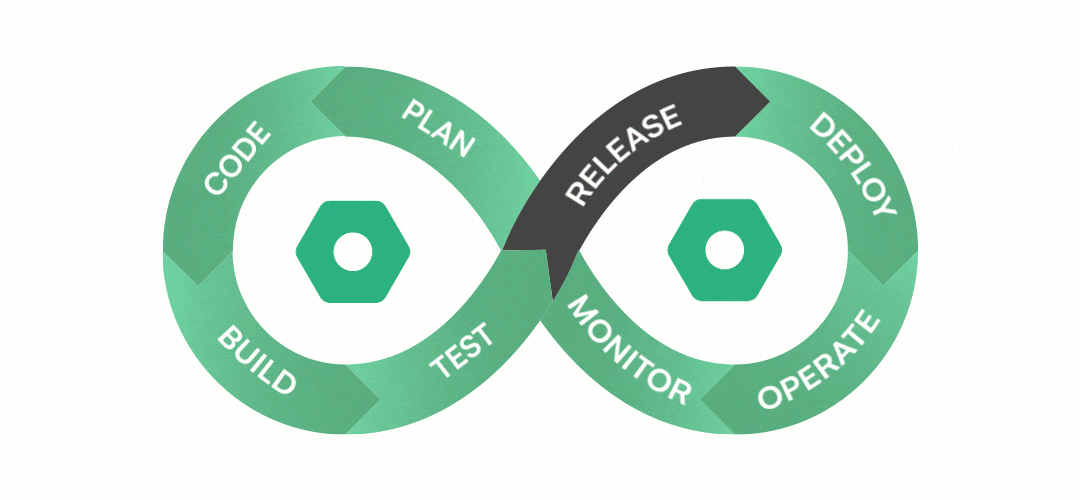
DevOps is a combination of two terms, ‘development’ and ‘operations’. This concept is based on continuous integration (CI) and continuous deployment (CD). DevOps focuses on enabling the software engineering team to work in a synchronized fashion. This is the polar opposite of the isolated fashion that traditional software engineering approaches follow.
Let us tell you that the DevOps methodology is particularly useful for engineering large-scale software with a complex architecture. This is because, with DevOps, the programs are engineered in smaller, easy-to-manage chunks.
Being a USD 8.7 billion market, DevOps is undoubtedly an essential part of the present-day IT sector. Naturally, more and more businesses are looking for ways to leverage the growing scope of DevOps. Let us tell you there are two ways to navigate around with DevOps: hiring an in-house DevOps team and outsourcing DevOps.
But, before we start debating on whether an in-house DevOps team is better than DevOps outsourcing (or vice-versa), we need to understand how exactly DevOps works. We will be shedding light on this topic in the coming section.
How DevOps Works: The DevOps Workflow
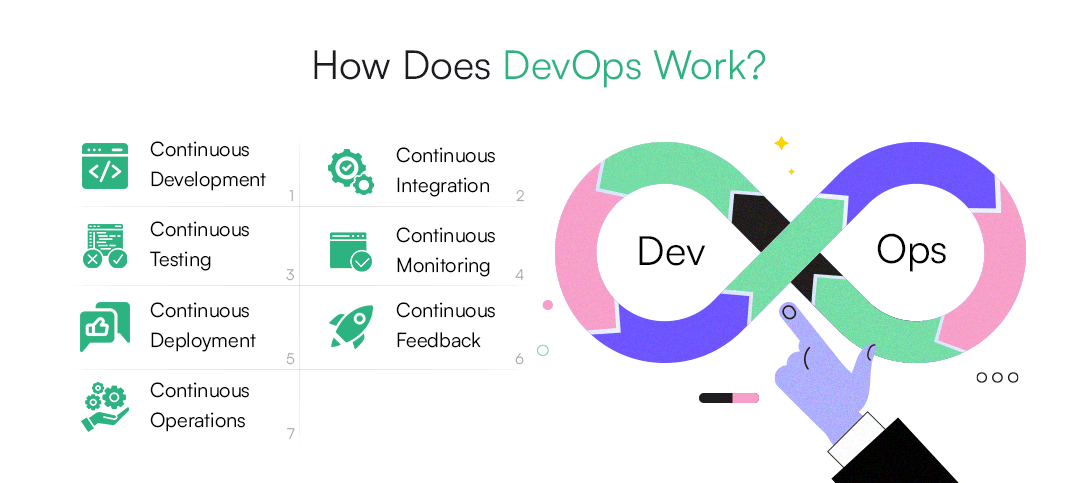
Regardless of whether you want to outsource DevOps services to an external vendor or want to build an in-house team of DevOps engineers, you should know how exactly the DevOps methodology works to fully leverage its potential.
Well, the DevOps processes are laser-focused on adding agility to the system development lifecycle. With that being said, how does one exactly make their software development process ‘agile’?
This is possible by following the core DevOps principles. These principles focus on maximum automation and improved collaboration between the development and operations teams.
Let’s look at each phase of the DevOps workflow to thoroughly understand this statement.
1. Continuous Development
This stage of the DevOps pipeline refers to planning, coding, testing, and integrating the software that is to be deployed as the final product. Continuous development ensures optimal code quality and mitigates risk factors by making the SDLC as agile as possible. As a result, the final product is likely to be engineered in less time without significant risks and threats.
2. Continuous Integration
In DevOps practices, all the code for the program is deposited to a common and shared code repository. This is usually done through the Git repository, where the source code, test plan, document, and other software architecture-related materials are stored in the .git folder. With continuous integration, it becomes easy for the developers working on the project to get access to the latest version of the code.
Once deposited to the repository, the code is tested automatically. This avoids deviations and coordination issues within the development team, regardless of whether you go with the DevOps outsourcing approach or hire in-house DevOps engineers. At last, through continuous integration, one can ensure that all the developers are working on the same and latest version of the code for optimal efficiency.
3. Continuous Testing
Here, the created program is continuously tested for bugs, errors, crashes, and security threats. Continuous testing ensures that the developed program is bug-free at all times and meets the specifications shared by the stakeholders.
Generally speaking, this phase involves using testing automation tools like TestNG, Selenium, TestSigma, Eggplant, etc. Testing automation is an excellent way to deliver bug-free and high-quality software. Additionally, the QA testers use docker containers to test the program parallelly. This, in turn, avoids errors in the overall functionality and usability of the program.
4. Continuous Monitoring
It is important for the software engineering team to continuously monitor the deployed system. This monitoring helps the engineering team gather critical data on the software’s performance and ensure its optimal quality at all times. Usually, it is ideal to use automation tools for this purpose. These tools are capable of monitoring the system and raising issues in real-time.
These issues can be as minor as a functionality bug or as major as a security threat. Continuous monitoring helps developers get timely feedback on the software and helps them seamlessly improvise the code’s quality.
5. Continuous Deployment
Here, the code is deployed to the servers and is made available to the users. Continuous deployment ensures that the latest version of the code is delivered to the servers at all times. Therefore, as soon as the code is validated from the testing phase, it is deployed to the servers.
With continuous deployment, it is easy for the DevOps team to ensure optimal and on-time monitoring of the software. This is because continuous monitoring will only take place with continuous deployment, ensuring optimal UX.
6. Continuous Feedback
While the feedback generated from continuous monitoring is important, it is essential to remember that user feedback is equally critical for a software’s success. After all, it is the end users that use the software. With continuous user feedback and review, you can gain access to insightful data on user preferences, likes, and dislikes and adapt accordingly.
You can follow a multi-channel approach to gain critical user feedback and gather data on user experience. With continuous user feedback, you will be able to determine the best strategy for continuous development and implement changes with ease.
7. Continuous Operations
The essence of DevOps is continuity throughout the product’s life cycle. For this reason, optimal and continuous operations are important for the successful engineering of a digital product.
With continuous operations, product owners can seamlessly reduce the downtime of the software and ensure its continuous availability. This aspect is useful in avoiding revenue loss and ensuring optimal code quality at all times.
Now that you know how exactly DevOps works, it is natural to wonder, ‘Should I outsource DevOps roles for my project or build an in-house team of DevOps engineers?‘ This will be our topic for the coming section.
DevOps Outsourcing vs. In-house DevOps Team: Which Approach to Choose?
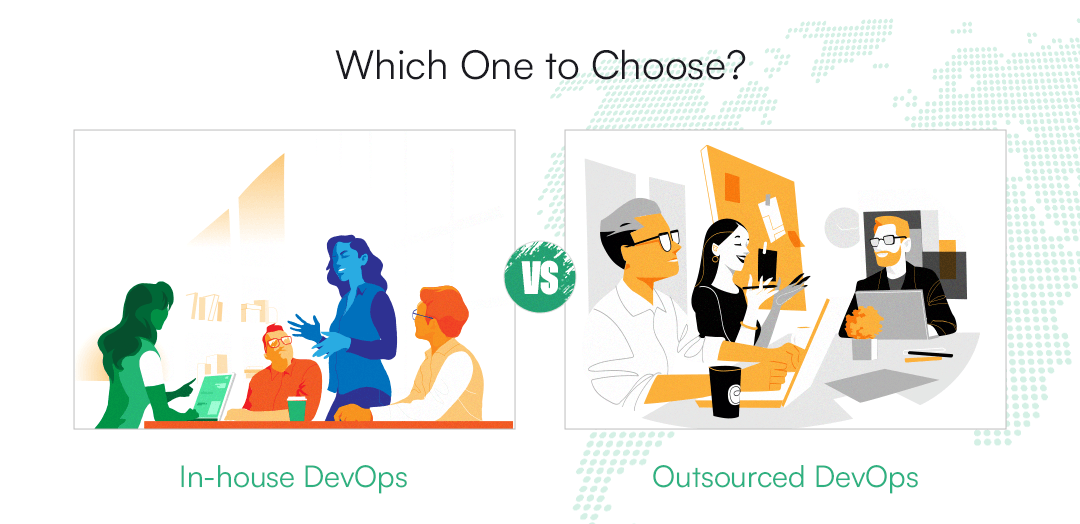
While in-house DevOps teams have been the way to go for many years now, the concept of outsourcing DevOps professionals is gaining rapid popularity lately. Both of these approaches have their own ideal use cases, benefits, and limitations. Therefore, we must thoroughly understand each of them to determine the best-suited choice.
In-house DevOps are full-time engineers who work dedicatedly for your organization. As opposed to outsourced DevOps, insourced engineers often work in an organization for a long time. Consequently, one can expect them to have a thorough understanding of the system’s architecture. The longer they work, the more proficient they will be.
However, in-house DevOps comes with its own challenges. For starters, in-house DevOps engineers require an optimal work environment to deliver the desired results. This may require additional investment and can increase project costs. As a result, most businesses outsource DevOps from an external vendor.
The concept of outsourcing DevOps is popularly known as DevOps-as-a-Service (DaaS). Here, you can hire top-notch DevOps engineers from an external vendor, like a DevOps outsourcing company. Alternatively, a business can also choose to outsource these services from a freelancer.
Do note that an outsourced DevOps team is more widely preferred as compared to its in-house counterpart. This is due to the many advantages that DevOps outsourcing offers. The coming section will shed light on these advantages.
6 Reasons to Outsource DevOps Engineers
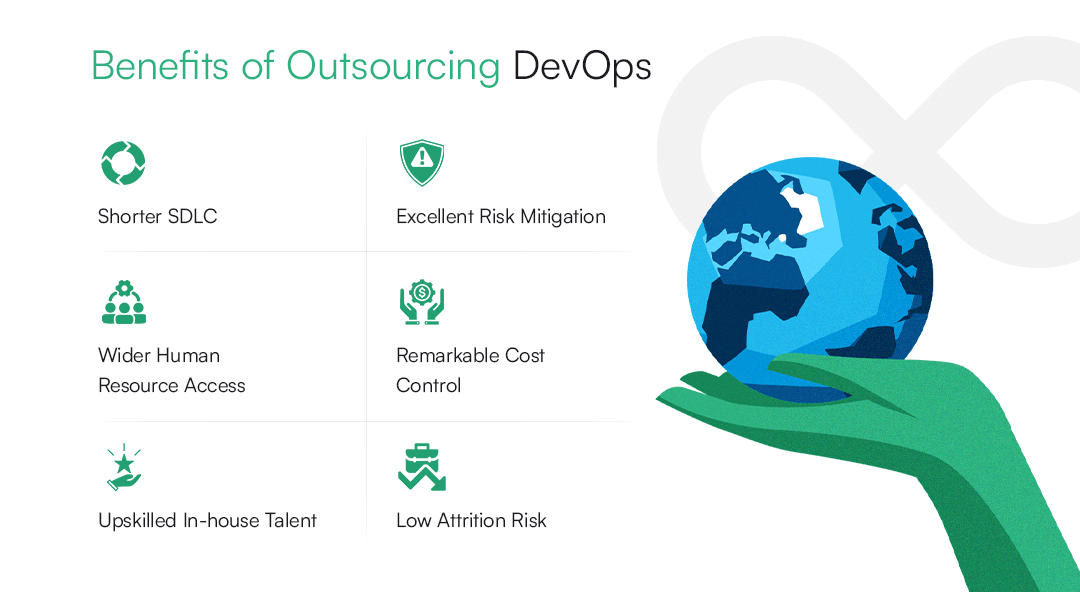
It is clearly established that ordering DevOps-as-a-Service is a much-preferred option over hiring in-house engineers. A business outsources DevOps for numerous reasons. Moving forward, we will take a look at some of the most popular reasons.
1. Shorter SDLC
It is a commonly known fact that the DevOps approach can considerably reduce the development timeline. However, in order to effectively harness this benefit of DevOps, having a proper IT infrastructure is important.
When you work with a DevOps outsourcing partner, you get complete access to the vendor’s infrastructure, talent pool, technology expertise, etc. In the end, your DevOps architecture can benefit from the latest automation tools, a complete team of DevOps engineers, top-notch IT skills, and world-class communication models that these DevOps agencies will have.
2. Excellent Risk Mitigation
Having an effective risk management plan is important to ensure optimal development efficiency, quality, and speed. This risk management plan helps the engineering team anticipate possible project risks and formulate a mitigation strategy for the same. However, the most strategically planned risk management plans are prone to loopholes and failures.
On the other hand, you can mitigate this risk to a large extent by working with an outsourced DevOps programmer. These outsourced programmers hold rich experience in working with clients from a broad spectrum of industries. As a result, your project is likely to get an experience-driven risk mitigation plan if you go for the DevOps outsourcing approach.
3. Wider Human Resource Access
It is essential to find the right DevOps talent to fully harness the benefits of the DevOps methodology. Doing so can ensure that you have the right DevOps engineering team working on your software’s development process. However, hiring with the in-house DevOps approach limits an organization’s talent pool to locally available DevOps engineers.
On the contrary, DevOps outsourcing is excellent when it comes to accessing a wide talent pool. You can follow this approach and set up a remote DevOps team for your project. This remote team can be based anywhere across the globe, preferably from locations like India and Ukraine, where the DevOps talent is of exquisite quality.
Moreover, this remote team of DevOps consultants and engineers is experienced in working with the cloud software engineering architecture, which is the foundation of the DevOps methodology. This way, by getting your DevOps outsourced, you can ensure optimal human resource quality and DevOps implementation.
4. Remarkable Cost Control
It is a commonly known fact that DevOps is a high-end methodology suitable for complex-level system engineering. With an already high project development cost, implementing DevOps might not be suitable in most cases. This is because the cost of hiring DevOps engineers can be really high.
Speaking in numbers, the average salary of a DevOps engineer in the USA is around $130,000/year. This figure can even go as high as $165,000 or even more. On the other hand, you can seamlessly control your project’s IT costs with DevOps Outsourcing. The average salary of a DevOps engineer in locations like India can be as low as $20,000/year. Developers for similar roles bill for $74,000/year in Ukraine.
For this very reason, it is an excellent idea to outsource DevOps and work with offshore DevOps partners from these countries. If you need more information on the cost aspect of DevOps outsourcing, keep on reading until the end. We have covered this factor in detail in one of the coming sections.
5. Upskilled In-house Talent
One of the most common assumptions among businesses is that they can either outsource their entire project or work with in-house engineers. Let us tell you that outsourcing is one of the most flexible approaches to software engineering. With that being said, you can safely use outsourcing to upskill your own in-house engineers.
To elaborate, you can utilize the skills of an outsourced DevOps engineer or even a team of engineers to augment your staff. A skilled and senior-level DevOps engineer, when outsourced, can mentor your in-house engineers. These senior engineers bring to the table a rich experience and portfolio. This way, you can upskill your own software engineering team without actually investing in learning and development.
6. Low Attrition Risk
DevOps is a continuous process and requires the consistent attention of the engineering team. The more a team works on the DevOps processes, the more familiar it will be with the system’s architecture. However, with in-house talent, there is always a high risk of employee attrition. This means that the in-house developers are likely to leave the organization directly, hindering the DevOps’ efficiency.
Outsourced DevOps developers, on the other hand, are known for providing long-term commitments. This is especially the case when you choose a DevOps outsourcing company for your project. The low abandonment risk and powerful risk management plans provided by outsourcing agencies make outsourcing an excellent choice for implementing DevOps.
These were a few noteworthy advantages of outsourcing your DevOps requirements. However, it is important to note that outsourcing is not a ‘one size fits all’ solution for DevOps. There is always a possibility of certain challenges that you may face with this approach. The coming section will provide information on these challenges.
Possible Challenges in DevOps Outsourcing
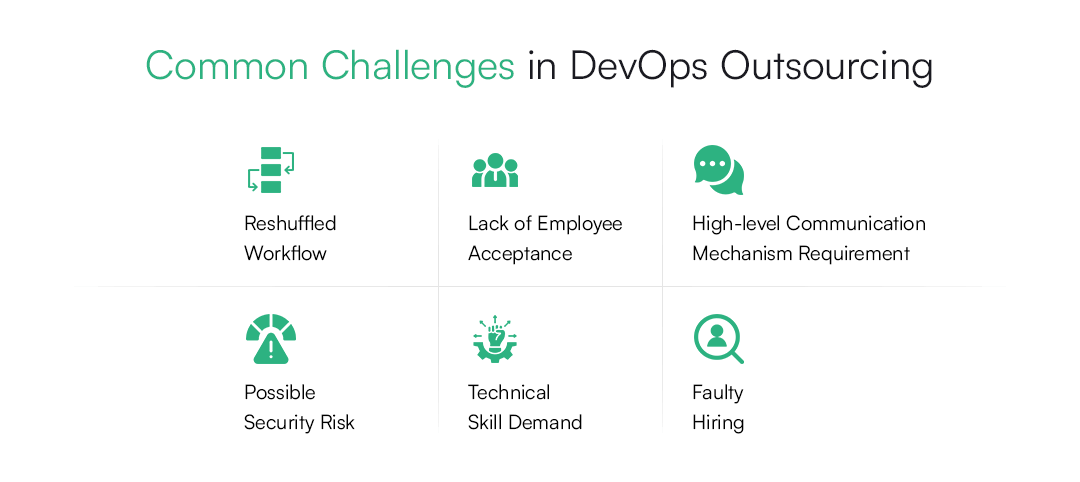
In the previous section, we discussed how DevOps-as-a-Service is a better and more beneficial concept than in-house DevOps. It is true that when you outsource DevOps developers, you can experience tremendous benefits and fully harness the potential of the DevOps methodology. However, do note there are certain possible risks that you need to keep in mind. These risks are mostly negligible but still worth knowing.
1. Reshuffled Workflow
Every organization follows a particular SDLC that matches its scope and demands. However, by working with an external DevOps team, you may need to adjust your workflow to that followed by the outsourcing vendor.
A business that outsources DevOps can commonly expect this challenge. While this is not a significant challenge, and most in-house teams adjust seamlessly to the vendor’s processes, it is true that the reshuffling process requires additional time and effort.
Therefore, you must be prepared to invest additional time and effort to help your team transition from the familiar workflow to a new, DevOps-centric one.
2. Lack of Employee Acceptance
In the previous section, we discussed how in-house employees usually need to restructure their workflow to match it with the DevOps outsourcing team. There are various cases where in-house engineers fail to adjust according to external vendor’s processes. Moreover, many times, outsourcing DevOps professionals can lead to a sense of competition among in-house engineers.
As a result, lack of acceptance is a common and critical risk with the DevOps outsourcing approach. If neglected, this risk can reduce the DevOps efficiency and lead to project hurdles. Therefore, you must address this risk to ensure optimal acceptance among the in-house engineers.
3. High-level Communication Mechanism Requirement
It is true that communicating with an internal team is a seamless task. This is chiefly because all the members of the in-house engineering team are available at the office premises in the same time zone. However, most organizations struggle to communicate with the remote DevOps team deployed by the outsourcing vendor.
Moreover, if you choose to outsource your project to offshore DevOps partners, you are likely to face numerous communication hurdles. Handling this challenge requires implementing complex communication mechanisms within the organization.
Of course, you and the outsourcing vendor need to be on the same page at all times. Therefore, you may need to work additionally on implementing this mechanism. This can lead to additional time and capital investment and even raise project costs significantly.
The best way to overcome this challenge is to deploy the Outsourced DevOps team to work with the on-site model. This way, you can ensure optimal communication quality without implementing a complex communication architecture for the purpose.
4. Possible Security Risk
Having optimal security for your product’s architecture is important. While DevOps ensures that your software is developed efficiently, it does not guarantee that your product is secure from threats. Moreover, when you outsource DevOps engineers from an external vendor, you are exposing your software to numerous risks.
There are various cases where the outsourcing vendor does not take the necessary steps to maintain the project’s integrity. This neglect of project security can be harmful to your business and can result in massive losses. This usually happens with ransomware attacks and SQL injection attacks, among other cyber threats.
We recommend that you choose an experienced IT outsourcing partner with a robust IT security infrastructure in place. This will help you successfully outsource your DevOps requirements while also efficiently mitigating project security risks.
5. Technical Skill Demand
When you go with the DevOps outsourcing approach, you can easily leverage the skills and expertise of an external vendor for your project. However, this does not mean that you do not require any technical skills at all.
While choosing the DevOps methodology, you need to be aware of certain technical aspects of software engineering. Knowing about these aspects can help you efficiently outsource DevOps services. Alternatively, you can also hire a DevOps product manager from the DevOps outsourcing team to handle all the technical aspects of the project.
6. Faulty Hiring
There are numerous factors that collectively contribute to the success of the DevOps methodology. However, at the end of the day, it all boils down to the DevOps engineers’ skills. Let us tell you that this is a commonly faced risk of businesses outsourcing DevOps.
When looking to onboard dedicated DevOps engineers from an outsourcing vendor, many businesses end up cutting short on the hiring process. This usually leads to faulty hiring or hiring an engineer with inadequate skills.
Nevertheless, you can overcome this challenge by requesting the outsourcing vendor to replace the current engineer with a new one. Most DevOps agencies offer this option to their clients. Moreover, we recommend that you follow a systematic and rigorous hiring process to ensure that you onboard the right DevOps engineers.
However, what exactly is this process, and how does one know if they are finding the right developers? We will be answering this question in the coming section.
Complete DevOps Outsourcing Process
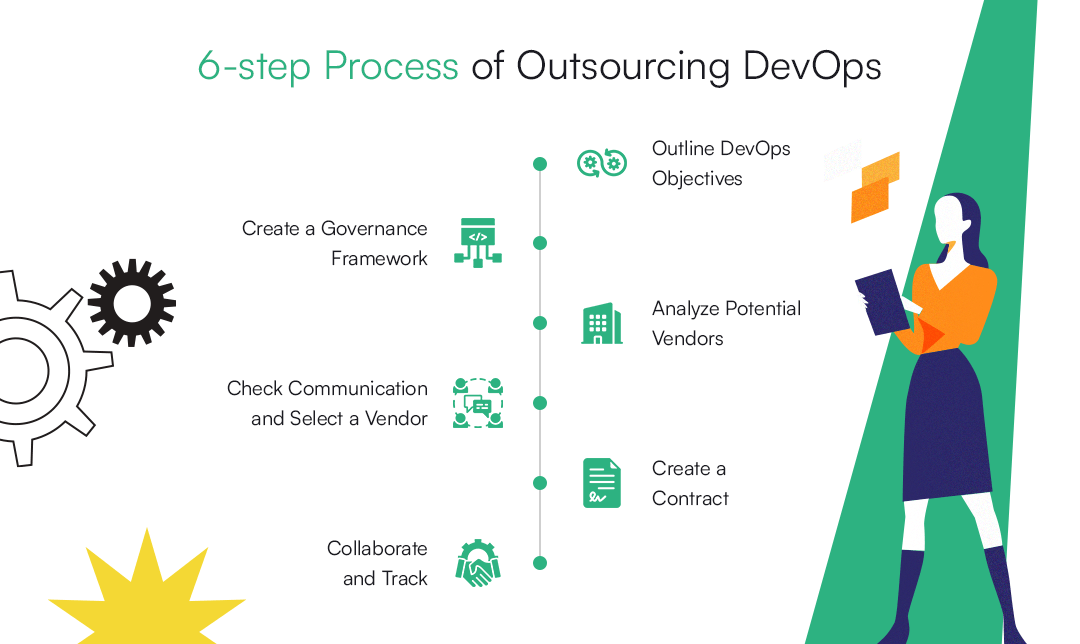
In order to efficiently outsource DevOps services, you need to keep certain factors into consideration. Here, we have laid out the complete and systematic process of finding an outsourcing vendor that covers these factors.
Following this process will enable you to outsource DevOps roles with ease and harness maximum advantages from the DevOps methodology. Without further ado, let’s take a look at this process.
Step 1: Outline DevOps Objectives
The purpose of outsourcing your project’s DevOps extends beyond reducing engineering costs. DevOps can, by large, help your organization improve its overall productivity. However, the benefits and purpose of DevOps go way further than that.
Therefore, you first need to clearly define what exactly you want to achieve by working with outsourced DevOps developers. This usually involves assessing the company’s business objectives and goals. Once you are clear about what you want to achieve, you can go ahead with creating a framework that can help you achieve this goal.
Step 2: Create a Governance Framework
The DevOps workflow is complicated the way it is for most organizations. In this case, outsourcing this methodology to an external partner requires implementing a flawless governance architecture.
It is through this architecture that the outsourced DevOps team can clearly understand the people involved in DevOps, along with their roles. The most popular practice here is to use TOM (Targeted Operating Model) to create a DevOps team that perfectly aligns in terms of mindsets, goals, and processes.
Step 3: Analyze Potential Vendors
Once you have understood your objectives from DevOps outsourcing and are ready with an actionable governance plan, it is time to find potential vendors. You can find numerous DevOps outsourcing companies on the internet offering dedicated DevOps engineers for hire.
Do note that this is one of the most critical parts of the overall process and can be a make-or-break factor. You must carefully scrutinize each potential vendor and assess their portfolio, experience, technical capabilities, etc., to make the right decision.
Step 4: Check Communication and select a Vendor
Earlier, we discussed how ordering DevOps-as-a-Service from an outsourcing partner requires implementing complex communication mechanisms. This is primarily due to the fact that the success of DevOps is often calculated with the communication efficiency of the DevOps engineers.
In any case, efficient communication is important for successful IT outsourcing. This requires selecting a vendor that is proficient in communication and coordination. As a result, you must especially assess the potential vendor’s communication skills before making a hiring decision. A popular practice here is to communicate with DevOps engineers from numerous agencies to check their professionalism and communication ability.
Once you have evaluated multiple vendors on the basis of their skills, DevOps engineering talent, communication abilities, quotations, etc., you can go ahead and hire an outsourcing partner.
Step 5: Create a Contract
Once you have selected a vendor to outsource DevOps requirements, you can sign a contract with them. This contract acts as a formal documentation of the project’s specifications and involves items like the DevOps outsourcing model, pricing, and other specifications.
Do note that there are mainly two types of contracts: fixed-scope contracts and evolving scope contracts. Each of these contracts impacts the success of the DevOps methodology differently.
Fixed Scope Contract
Fixed scope contracts are essentially result-oriented documents that limit the product’s scope and growth to pre-defined boundaries. These types of contracts are often not ideal for DevOps, simply due to the fact that DevOps is based on agility and adoption to changing environments. As a result, most businesses go with the second option, which is evolving scope contracts.
Evolving Scope Contract
As a leading DevOps outsourcing company, we can tell you that evolving scope contracts are the best choice for a business that outsources DevOps. These types of contracts foster innovation and help businesses fully harness the advantages of the DevOps methodology.
By implementing these contracts, you can ensure that the processes followed by the remote DevOps team align with the evolving market trends and requirements.
Step 6: Collaborate and Track
Once you have the contract ready, you can go ahead and start collaborating with the vendor and initiate the DevOps journey. However, this is not the end of the process, as there is a lot that needs to be done after you have started collaborating with the outsourcing vendor.
You need to pre-determine various parameters of the DevOps process, like deployment rate, implementation time, failure rate, etc. Fixing these parameters and metrics will help you determine whether or not outsourcing DevOps is working well for you. Moreover, you can also use these parameters to monitor the DevOps process and create improvisation strategies.
We are sure that by now, you know how to outsource your DevOps requirements. So far, we have covered all the necessary information on working with a DevOps outsourcing partner. Let’s discuss the most important part of the topic: the cost of outsourcing your DevOps.

DevOps Outsourcing Cost: How Much Should You Pay?
Most organizations planning to avail DaaS solutions struggle to determine the IT costs with DevOps outsourcing. This is also one of the most important factors to consider when going with the outsourcing approach to implement DevOps practices in your organization.
When it comes to the cost of hiring outsourced DevOps teams, a lot depends on the location of the outsourcing vendor. Let’s understand this factor in detail.
Cost of Outsourcing DevOps Professionals Across the Globe
Different countries have different salaries. In this case, if you are looking to work with an external team of DevOps consultants and engineers, you must know the average hourly rate for top outsourcing destinations.
Let’s take a look at how much DevOps engineers charge in some of the leading IT outsourcing destinations.
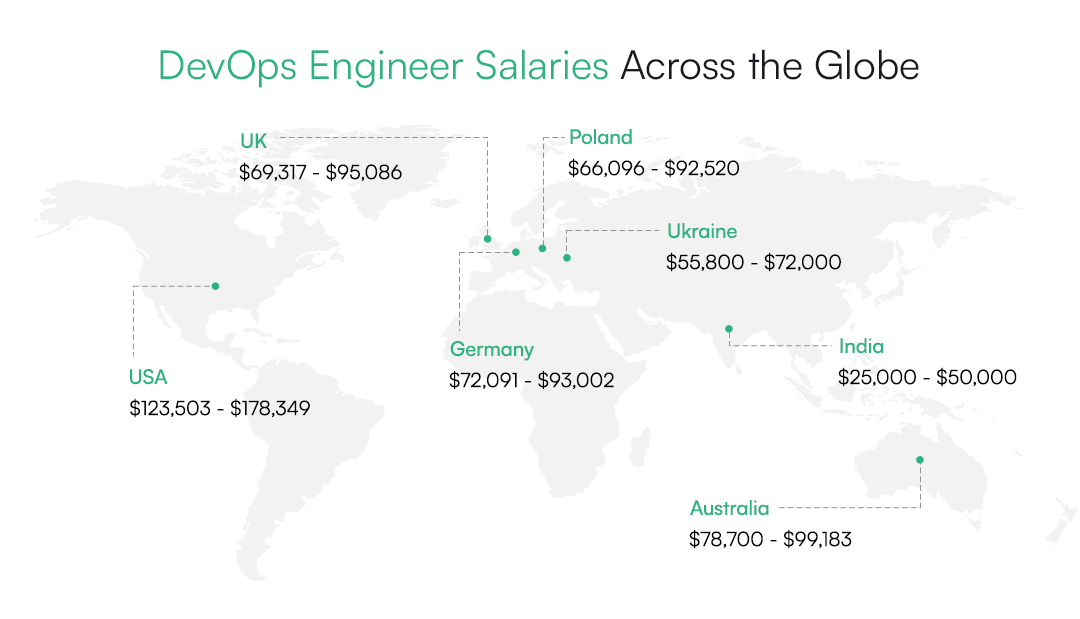
Through this data, it is clear that countries like India, Ukraine, and Poland are the best choices for setting up an outsourced DevOps programmer team. Choosing DevOps engineers from these countries will enable you to get the most cost-efficient and high-end solutions for your DaaS requirements.
However, do note that there is more to outsourcing costs than just the vendor’s location. Let’s discuss the factors that impact the cost of DevOps outsourcing.
Factors that Impact the Cost of Outsourcing DevOps Services
The cost of outsourcing your requirements to an external DevOps vendor can vary based on a number of factors. Some of these factors are:
- Experience of the outsourced DevOps developers
- Project complexity
- Market demand and supply
- Targeted industry
- DevOps architecture
- Onboarding and training costs
Apart from these factors, there are numerous other factors that can impact the overall cost. We, therefore, recommend you connect with experienced DevOps consultants like those from Auxano Global Services and get a precise quotation for your requirements.
We have reached the end of the blog. So far, we have provided all the information needed to successfully find an outsourcing partner for DevOps and harness the vast potential of the DevOps methodology.
Summing It Up
Outsourcing DevOps is the latest trend in the present-day IT industry. This approach outshines in-house DevOps in numerous ways and is highly preferred by organizations all across the globe. However, in order to efficiently outsource DevOps to an external vendor, there are a lot of things you need to take into consideration.
First, you must be aware of the pros and cons of outsourcing this particular methodology. Knowing these pros and cons is essential for determining whether or not outsourcing is the right choice for your DevOps requirements.
Second, you must understand the DevOps workflow and process. Knowing this process will help you understand how exactly DevOps works, therefore easing its implementation.
Last but not least, you should be aware of the process of finding the right DevOps outsourcing company. This is one of the most critical parts of the concept and can be a make-or-break factor.
This blog has shed light on all of the above-mentioned points and has given a clear and crisp explanation of the right way to outsource DevOps developers. All you need to do now is start your hunt for a vendor offering DevOps services.
Are You Looking for a Skilled DevOps Partner?
Auxano Global Services is a CMMI Level 3 accredited IT consulting and product engineering company, offering end-to-end DevOps solutions. We have a team of 10+ dedicated DevOps engineers with wide domain experience and top-notch skills available for hire.
We are proficient in offering cutting-edge DevOps outsourcing services for software projects of all scopes and scales. Get in touch with us today to hire our engineers for your project and leverage our wide DevOps experience and expertise.

Frequently Asked Questions on DevOps Outsourcing
1. Who are the key people involved in the DevOps pipeline?
To leverage the maximum benefits from the DevOps methodology, you will need a team of DevOps engineers with the right skills and expertise. Here are the key roles in a typical DevOps team:
- DevOps Evangelist
- Code Release Manager
- Automation Architect
- IT Operations Engineer
- Configuration Management Engineer
- DevOps Data Analyst
- DevOps Software Engineer
- Product Manager
- Security Engineer
Do note that the exact team requirements vary from one project to the other. Therefore, your particular team may or may not require all of these roles. We recommend you consult with an experienced agency to find out your exact DevOps team requirements.
2. How much does it cost to outsource my project’s DevOps?
There is no one fixed answer to this question, as the cost of outsourcing your particular project’s DevOps depends on numerous factors. A lot also depends on the outsourced DevOps programmer, their skills, expertise, etc.
Nevertheless, if you are looking for estimates, let us tell you that you can hire a DevOps programmer from an external vendor at anywhere from $30/hour to $45/hour. Do note that these figures are just estimates. Get in touch with our DevOps experts today to get a precise quotation for your project.
3. What are the key roles and responsibilities in outsourcing DevOps?
Some of the key roles and responsibilities in the DevOps pipeline include:
- Product and Infrastructure Planning, Development, and Testing
- CI/CD Pipeline Support
- Customer-team Coordination
- Risk Management
- Automation Implementation
These roles and responsibilities are what make up a successful DevOps pipeline. We, therefore, recommend that you closely follow these roles for successful DevOps outsourcing.
4. How do I know if outsourcing is the right choice for my project’s DevOps implementation?
Most businesses often struggle to determine whether or not outsourcing is the right choice for their DevOps requirements. However, let us tell you that outsourcing is the most commonly adopted approach while implementing DevOps.
Outsourcing can enable you to build a complete team of DevOps engineers without actually hiring any DevOps engineers. Moreover, you can leverage the cost-efficiency, flexibility, scalability, and agility of the outsourcing approach to ensure optimal and successful DevOps implementation. These are a few factors that make it a great idea to outsource DevOps developers.
5. What are the different models for outsourcing DevOps processes?
When choosing to outsource your DevOps requirements, there are numerous models you can choose from. These models are:
- Hiring DevOps Consultants
- Hiring DevOps Engineers
- Dedicated DevOps Team
- Managed DevOps Services
Which of these models will be ideal for your project is a choice that depends on numerous factors. You can consult with our DevOps team today to find out the best outsourcing model for your project.
6. How can I outsource DevOps to Auxano Global Services?
To outsource your project’s DevOps to our team, all you need to do is send us your requirements at admin@auxanoglobalservices.com. Our experts, upon a close scrutinization of your requirements, will build a flawless DevOps implementation strategy for your software.
We use our top-notch project skills and experience to offer state-of-the-art DaaS solutions to our clients. Connect with us today for your DevOps outsourcing requirements and kickstart your DevOps journey with industry-leading experts.




